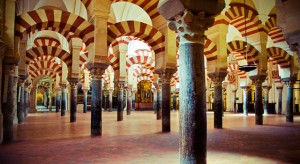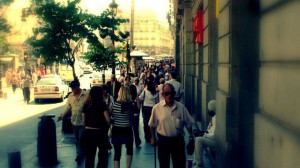Chao was born of Galician parents but grew up in Paris, where he formed anarcho-rock outfit Mano Negra. A multi-lingual rabble who toured Europe and Latin America to great acclaim, Mano Negra’s energy made up for a lack of songcraft. Chao struck out on his own with success, releasing the unique and mesmerising Clandestino in 1998. Such inspiration seemed unrepeatable; until Chao himself released an album that sounded exactly the same as the first one, called Próxima Estación: Esperanza in 2001. A revolutionary maestro to some, a vertically challenged fool in a silly hat to others. … [Read more...] about Manu Chao
Manolo García
His band, El Último de la Fila, were easy to snigger at, perhaps because they looked so un-rock ‘n’ roll, but you can’t argue with their commercial and critical success, which led some critics to label them “the Spanish REM”. However, García’s solo career has been more interesting than that of his former band. His voice is that of a broody, backwoods troubadour and it can make the most ordinary pop song sound like a heartbreaking lament (just listen to Pájaros de barro if you’re still not convinced). … [Read more...] about Manolo García
Los Rodríguez
Strictly speaking, it could be argued they weren’t “Spanish”, given that two founder members were Argentinean, but Los Rodríguez were seen as a Spanish band, given their Madrid base and their sound, which mixed Latin music, such as flamenco, with guitar rock. Hits such as Palabras más palabras menos showed they could rock, but more melancholic numbers such as Para no olvidar consolidated their unique sound and put them in a generation’s hearts. Front man Andrés Calamaro and fellow Argentine Ariel Rot are still forging acclaimed solo careers. … [Read more...] about Los Rodríguez
Córdoba
Andalusia has a handful of candidates for this list, not least Granada and Seville. But the former capital of the Islamic caliphate comes out on top for several reasons. The Mezquita is the obvious one: a massive, labyrinthine mosque that is beautiful despite having a Catholic cathedral dumped on top of it. In addition, central Córdoba has maintained its appeal despite the brutal urban development raging around it, and what’s better than a wander around the Jewish quarter after a plate of rabo de toro? … [Read more...] about Córdoba
Barcelona
An obvious choice for obvious reasons: the Sagrada Familia temple, the Gaudí park, Montjuïc, the finest football team on earth, more Gaudí, and a beautiful, freakish coastal skyline. But beyond the evident draws there is plenty more. The Ramblas may be a haven for pickpockets and boozy foreigners and have all the charm of a German autobahn, but just round the corner is the smaller, more pleasant Rambla del Raval. The most rewarding parts of Barcelona are where the visitors rarely tread. … [Read more...] about Barcelona
Vigo
Many will raise an eyebrow at the sight of this Galician industrial town being included and will argue that its more fêted rivals/neighbours Santiago de Compostela and A Coruña both make stronger cases. But anyone who has gazed across the Ría de Vigo to Cangas after strolling the length of this city’s immaculately maintained promenade will understand. There’s not much in particular to see or do in Vigo, but that’s part of its appeal: it’s not trying to pander to anyone. Cheap accommodation, a maze of knee-aching hills and stupendous octopus seal the argument. … [Read more...] about Vigo
Bilbao
Not so long ago, Bilbao was seen as an unattractive place, known for its industry and the dark-suited bodyguards who escorted public figures threatened by ETA around town. But today the city is perhaps the most obvious example of “modern Spain”. Much of its regeneration is due to Frank Gehry’s angled, shining Guggenheim Museum, perched on the bank of the Nervión river. The building boosted the economy, draws millions of tourists and has given the city a renewed confidence and sense of identity. Also, where else can you find such an artful giant spider? … [Read more...] about Bilbao
Madrid
When it comes to sights, the capital can’t compete with Barcelona. The Almudena Cathedral is pretty ugly, there’s no waterway to speak of, and the skyline is basically four massive, incongruous towers plonked at one end of town. But the point about Madrid is that you don’t see it, you live it. Go for a few drinks in Lavapiés, flea-market shopping in La Latina’s Rastro, or an autumnal walk through the Retiro, and tell me you’d rather be in Barcelona, queuing three hours to get into a cathedral that hasn’t even been finished… … [Read more...] about Madrid
The story behind the story: newspaper country reports (Audio)
Country Reports An article Qorreo published called Madrid: capital of the special advertising section drew a particularly strong response. In this audio clip Nick Lyne, who wrote it, discusses the story and some of the background to the murky world of newspaper country reports. … [Read more...] about The story behind the story: newspaper country reports (Audio)
Retreading a Basque past in three dimensions
“Anyone who approaches the Basques without prejudices will find them of great interest, not as an exception among the other races in the world, but as a living museum of man’s history, where one can understand and see what remains of an ancient Europe, now disappeared from other regions, but which is still alive in this peaceful corner of the Pyrenees.” So wrote British author Rodney Gallop, in his 1930 study of the Basque Country. In the eight decades since, much may have changed in the region, but its allure for foreign intellectuals has refused to dim, with the likes of Ernest Hemingway, Orson Welles and American writer Mark Kurlansky, all falling under its spell. Irish writer Paddy … [Read more...] about Retreading a Basque past in three dimensions









